2012 KOKUFU BONSAI EXHIBITION REPORT
+19
hiram
Todd Ellis
jrodriguez
David Carvalho
sirius
xuan le
Jose Acuña
Andrei Darusenkov
Glaucus
Rob Kempinski
kauaibonsai
marcus watts
Budi Sulistyo
Max
Ed Trout
Jesse
fredtruck
Billy M. Rhodes
William N. Valavanis
23 posters
Page 1 of 2
Page 1 of 2 • 1, 2 
 2012 KOKUFU BONSAI EXHIBITION REPORT
2012 KOKUFU BONSAI EXHIBITION REPORT
The 86th Kokufu Bonsai Exhibition opened on Friday, February 3 at an industrial trade center in Asakusua, Tokyo Japan. The event was moved last year and this year while the Metropolitian Art Museum is being renovated to make it handicap accessable for the elderly and those with broken feet. It will return to the art gallery in Ueno next February.
Since I was teaching at the California Shohin Bonsai Seminar in California on Friday, Saturday and Sunday I had to miss the opening of the exhibition. I left California on Monday morning, arrived in Tokyo Tuesday night and was at the exhibition all day on Wednesday and today on Thursday. Sorry for the report delay, but had to teach.
Quick observations:
Attendance down, quality of bonsai were not as in the past when the exhibition was at the art gallery. But still beautiful masterpieces!
There were four bonsai displayed with suiseki. (don’t listen to those who tell you the Japanese don’t display stones with their bonsai)
It was very interesting to see nearly every small and medium size cascade bonsai tied down to the tables with fishing line and push pins because of the threat of earthquakes. I’m sure the fishing line will keep the pots on the tables IF an earthquake comes…
Doug Paul, The Kennett Collection in PA had a beautiful Shimpaku on display. The one he had on display last year, unfortunately washed away in the Tusnami.
There were three bougainvillea bonsai.
Several Chojubai Dwarf Japanese flowering quince on display including a rare white cultivar.
73 medium size bonsai
Only 7 shohin bonsai displays, 6 box stands and one half box stand.
7 large bonsai did not have any accessories.
Four Kokufu Awards (National Awards), Japanese black pine, Shimpaku juniper, Satsuki Osakazuki azalea and Shishigashira Japanese maple.
Sales area at the nearby Ueno Green Club was deserted! There were actually more vendors attending tables than customers, but it did get busier later on.
I spent all day Wednesday and Thursday studying at the exhibition. Tomorrow is the last day and I’ll be there all day studying too.
Bill

Exhibition view

Japanese black pine award winner
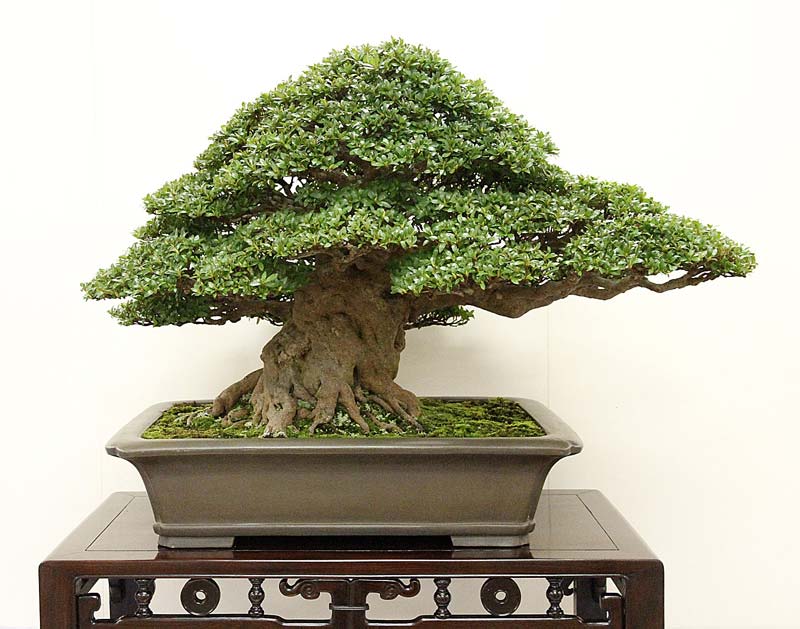
Satsuki Osakazuki award winner
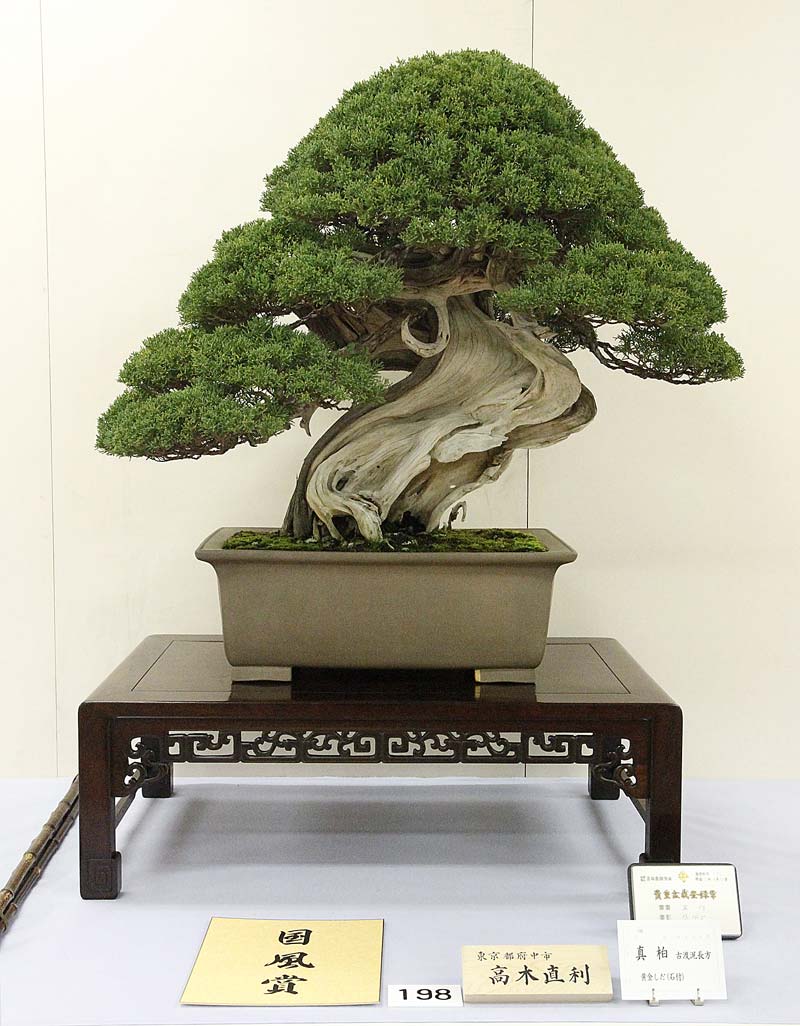
Shimpaku juniper award winner

Shishigashira Japanese maple award winner
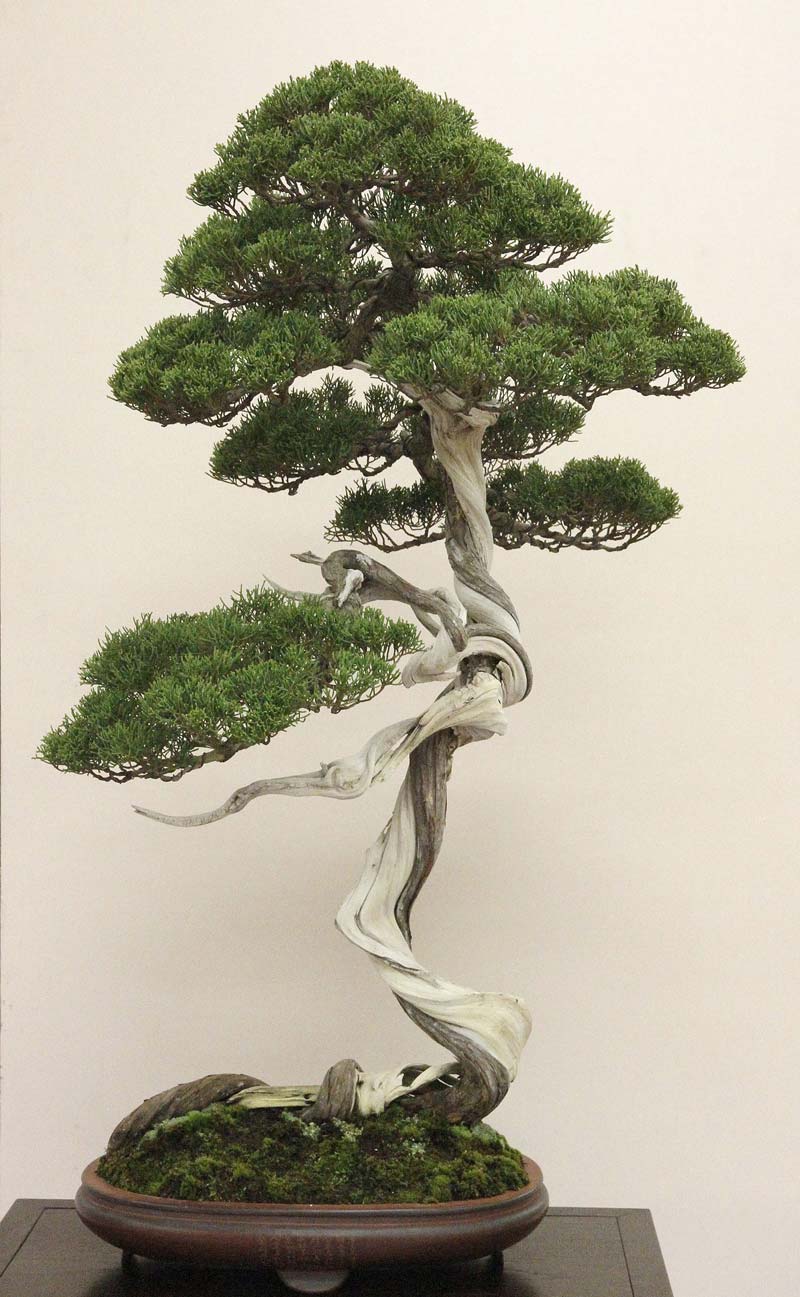
Shimpaku juniper, one of my favorite bonsai in the exhibition
Since I was teaching at the California Shohin Bonsai Seminar in California on Friday, Saturday and Sunday I had to miss the opening of the exhibition. I left California on Monday morning, arrived in Tokyo Tuesday night and was at the exhibition all day on Wednesday and today on Thursday. Sorry for the report delay, but had to teach.
Quick observations:
Attendance down, quality of bonsai were not as in the past when the exhibition was at the art gallery. But still beautiful masterpieces!
There were four bonsai displayed with suiseki. (don’t listen to those who tell you the Japanese don’t display stones with their bonsai)
It was very interesting to see nearly every small and medium size cascade bonsai tied down to the tables with fishing line and push pins because of the threat of earthquakes. I’m sure the fishing line will keep the pots on the tables IF an earthquake comes…
Doug Paul, The Kennett Collection in PA had a beautiful Shimpaku on display. The one he had on display last year, unfortunately washed away in the Tusnami.
There were three bougainvillea bonsai.
Several Chojubai Dwarf Japanese flowering quince on display including a rare white cultivar.
73 medium size bonsai
Only 7 shohin bonsai displays, 6 box stands and one half box stand.
7 large bonsai did not have any accessories.
Four Kokufu Awards (National Awards), Japanese black pine, Shimpaku juniper, Satsuki Osakazuki azalea and Shishigashira Japanese maple.
Sales area at the nearby Ueno Green Club was deserted! There were actually more vendors attending tables than customers, but it did get busier later on.
I spent all day Wednesday and Thursday studying at the exhibition. Tomorrow is the last day and I’ll be there all day studying too.
Bill

Exhibition view

Japanese black pine award winner

Satsuki Osakazuki award winner

Shimpaku juniper award winner

Shishigashira Japanese maple award winner

Shimpaku juniper, one of my favorite bonsai in the exhibition
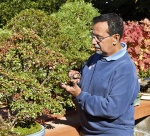
William N. Valavanis- Member
 Re: 2012 KOKUFU BONSAI EXHIBITION REPORT
Re: 2012 KOKUFU BONSAI EXHIBITION REPORT
Thanks Bill,
Wow, you are one busy bonsai teacher ! Beautiful trees & photos. I have one comment on a subject that has been a point of contention, at least here in Florida. Can a tree be displayed with wire on it ? I say it is OK, if the wire is required to complete the shape that the artist wants, and the wire is properly applied, and not obtrusive. The Shimpaku juniper that you like ( and so do I ) is wired, but that fact does not take away the beauty of that tree ( IMHO ) Would appreciate your comments.
Ed
Ed Trout- Member
 Re: 2012 KOKUFU BONSAI EXHIBITION REPORT
Re: 2012 KOKUFU BONSAI EXHIBITION REPORT
Thank you very much Bill!!
More more more please!!!
best wishes!
Max
More more more please!!!
best wishes!
Max

Max- Member
 Re: 2012 KOKUFU BONSAI EXHIBITION REPORT
Re: 2012 KOKUFU BONSAI EXHIBITION REPORT
Thanks for sharing Bill. Very nice exhibition.
Budi
Budi
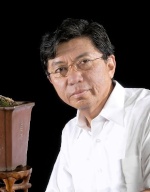
Budi Sulistyo- Member
 Re: 2012 KOKUFU BONSAI EXHIBITION REPORT
Re: 2012 KOKUFU BONSAI EXHIBITION REPORT
Ed Trout wrote:
Can a tree be displayed with wire on it ? I say it is OK, if the wire is required to complete the shape that the artist wants, and the wire is properly applied, and not obtrusive. The Shimpaku juniper that you like ( and so do I ) is wired, but that fact does not take away the beauty of that tree ( IMHO ) Would appreciate your comments.
Ed
hI,
Personally I think it is absolutely fine for a mature refined tree to be shown with thin unobtrusive wire on the pads and or thin guy wires to hold the occasional branch in place. The wiring must be the minimum amount needed to do the task, very neat and never visible crossing the trunk from the front. I totally disagree with newly styled trees fully wired being put in shows - they are not in any way show ready and are still just trees in training - it is a great shame when you see posts saying "I just bought this, wired it at the workshop and repotted it ready for the club show later in the year". I also feel a tree once shown should not be re-entered to the same event for at least 4 or 5 years - this would lessen the temptation to rush unready trees to the show benches.
Nice write up and observation, Thanks
Marcus

marcus watts- Member
 Re: 2012 KOKUFU BONSAI EXHIBITION REPORT
Re: 2012 KOKUFU BONSAI EXHIBITION REPORT
thanks for the pictures and writeup, bill. I enjoy your observations. the trees are beautiful
best wishes, sam
best wishes, sam
kauaibonsai- Member
 Re: 2012 KOKUFU BONSAI EXHIBITION REPORT
Re: 2012 KOKUFU BONSAI EXHIBITION REPORT
Thanks for the report Bill, Almost as good as going there except without the jet lag. 
I concur Marcus. A little wire artfully applied is ok. I hate when I walk by a tree in a show and all my electronic devices misbehave due to induced magnetic fields from massive amounts of wire on a show tree. However, I do draw the line at guy wires - not on a tree in a show. To me it is an early training (phase 2 technique).
marcus watts wrote:Ed Trout wrote:
Can a tree be displayed with wire on it ? I say it is OK, if the wire is required to complete the shape that the artist wants, and the wire is properly applied, and not obtrusive. The Shimpaku juniper that you like ( and so do I ) is wired, but that fact does not take away the beauty of that tree ( IMHO ) Would appreciate your comments.
Ed
hI,
Personally I think it is absolutely fine for a mature refined tree to be shown with thin unobtrusive wire on the pads and or thin guy wires to hold the occasional branch in place. The wiring must be the minimum amount needed to do the task, very neat and never visible crossing the trunk from the front. I totally disagree with newly styled trees fully wired being put in shows - they are not in any way show ready and are still just trees in training - it is a great shame when you see posts saying "I just bought this, wired it at the workshop and repotted it ready for the club show later in the year". I also feel a tree once shown should not be re-entered to the same event for at least 4 or 5 years - this would lessen the temptation to rush unready trees to the show benches.
Nice write up and observation, Thanks
Marcus
I concur Marcus. A little wire artfully applied is ok. I hate when I walk by a tree in a show and all my electronic devices misbehave due to induced magnetic fields from massive amounts of wire on a show tree. However, I do draw the line at guy wires - not on a tree in a show. To me it is an early training (phase 2 technique).

Rob Kempinski- Member
 Re: 2012 KOKUFU BONSAI EXHIBITION REPORT
Re: 2012 KOKUFU BONSAI EXHIBITION REPORT
I really like that azalea. Often even the super impressive trunked azalea look a bit generic to me, despite being so strong and powerful. But this one really has strong character. So well done. Some special bonsai at these events for sure.
I was typing an email to an azalea acquaintance in Japan so I just had to show him this azalea as well. I am sure he will be interested and thankful to be able to see a picture so fast after the event thanks to you.
I was typing an email to an azalea acquaintance in Japan so I just had to show him this azalea as well. I am sure he will be interested and thankful to be able to see a picture so fast after the event thanks to you.
Glaucus- Member
 Re: 2012 KOKUFU BONSAI EXHIBITION REPORT
Re: 2012 KOKUFU BONSAI EXHIBITION REPORT
Hi Rob,
I like the magnetic field analagy. .Interesting what you say about a guy wire, and yes i agree that an ugly guy wire going all the way down to the pot or soil surface would indicate a tree in training. I must admit in my head when i wrote it i was thinking of the clever little hidden guy wires used in the foliage to just ease a branch that moves an inch out of place back down (or up). Wires like this i use 0.5mm copper and anchor to the branch or jin nearest so they are often only a few cm long.
.Interesting what you say about a guy wire, and yes i agree that an ugly guy wire going all the way down to the pot or soil surface would indicate a tree in training. I must admit in my head when i wrote it i was thinking of the clever little hidden guy wires used in the foliage to just ease a branch that moves an inch out of place back down (or up). Wires like this i use 0.5mm copper and anchor to the branch or jin nearest so they are often only a few cm long.
'tree in training' is the key point though - this is a tree to keep at home, not put in a show...My way to decide.... would the tree look the same but just untidy round the edges with the wire removed, this would be ok. If the tree branches, trunk and foliage could move back to different positions and the tree design is lost the tree is still in training and still years away from show ready.
cheers Marcus
I like the magnetic field analagy.
'tree in training' is the key point though - this is a tree to keep at home, not put in a show...My way to decide.... would the tree look the same but just untidy round the edges with the wire removed, this would be ok. If the tree branches, trunk and foliage could move back to different positions and the tree design is lost the tree is still in training and still years away from show ready.
cheers Marcus

marcus watts- Member
 Re: 2012 KOKUFU BONSAI EXHIBITION REPORT
Re: 2012 KOKUFU BONSAI EXHIBITION REPORT
Bill, many thanks for the report and beautiful photos! Just interested, why shishigashira bark looks as if it is of two very different colors?
Andrei Darusenkov- Member
 Re: 2012 KOKUFU BONSAI EXHIBITION REPORT
Re: 2012 KOKUFU BONSAI EXHIBITION REPORT
Because the dark part is wet.
You can see some water spray on the table.
Regards
Jose Acuña
You can see some water spray on the table.
Regards
Jose Acuña
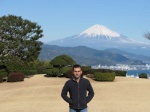
Jose Acuña- Member
 Re: 2012 KOKUFU BONSAI EXHIBITION REPORT
Re: 2012 KOKUFU BONSAI EXHIBITION REPORT
Thanks Bill for the report, it is nice to see some beautiful trees.
As you said the quality of trees are not as good as in the past is it due to the new location of the show or due to too many good trees lost during the Tsunami?
Xuan
As you said the quality of trees are not as good as in the past is it due to the new location of the show or due to too many good trees lost during the Tsunami?
Xuan
xuan le- Member
 Kokufu
Kokufu
Hello,
Kokufu is without any doubt the best exhbition of Bonsai in the world. Amazing photos and outstanding trees. The winners are simply fabulous.
Thank you so much for the photos, we have much to learn from them.
Cheers,
Kokufu is without any doubt the best exhbition of Bonsai in the world. Amazing photos and outstanding trees. The winners are simply fabulous.
Thank you so much for the photos, we have much to learn from them.
Cheers,
David Carvalho- Member
 Re: 2012 KOKUFU BONSAI EXHIBITION REPORT
Re: 2012 KOKUFU BONSAI EXHIBITION REPORT
David Carvalho wrote:Hello,
Kokufu is without any doubt the best exhbition of Bonsai in the world. Amazing photos and outstanding trees. The winners are simply fabulous.
Thank you so much for the photos, we have much to learn from them.
Cheers,
David,
Yes, Kokufu Ten is one of the top bonsai exhibitions in the world, so is Sakufu Ten, Meihen Ten, Gafu Ten, Chwa Fong (Taiwan Bonsai Creators), Hwa Fong (Taiwan National Show), PPBI (Indonesian Bonsai Show), Noelander's Trophy, Exhibición del Museo de Alcobendas and many others around the world. Different Styles and Distinct Flavors.....
Warm Regards,
Jose Luis
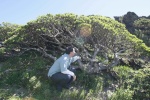
jrodriguez- Member
 Re: 2012 KOKUFU BONSAI EXHIBITION REPORT
Re: 2012 KOKUFU BONSAI EXHIBITION REPORT
Bill,
Thanks for posting this review. Somehow this tree looks familiar to me. I believe you published an article a few years ago that featured the training process of this tree. If i am not mistaken, Mr. Kimura Masahiko was the artist.
I really like the antique chinese pot it is in. On another note, please notice the right foot. It was repaired using gold, a technique common to valuable chinese antique bonsai pots.

Thanks for posting this review. Somehow this tree looks familiar to me. I believe you published an article a few years ago that featured the training process of this tree. If i am not mistaken, Mr. Kimura Masahiko was the artist.
I really like the antique chinese pot it is in. On another note, please notice the right foot. It was repaired using gold, a technique common to valuable chinese antique bonsai pots.


jrodriguez- Member
 Re: 2012 KOKUFU BONSAI EXHIBITION REPORT
Re: 2012 KOKUFU BONSAI EXHIBITION REPORT
Glaucus wrote:Well name card says 'Takagi Naotoshi'?
OK, that might be the owners name, which might not actually be the creator.
Thanks,
Jose Luis

jrodriguez- Member
 Opinions
Opinions
Hello José Luis,
Sorry to totally disagree but you can't really compare 86 Kokufu's to any other real Bonsai exhibition in the world, not only Kokufu has raised the standards every year has they set the new tree design trends and we must be humble enough to accept that. I admire many exhibitions around the world but I'm sure that even the organizers of those exhibitions you pointed out, look up at Kokufu not only with respect but has a goal to achieve.
We have much to learn not only from 86 Kokufu's but for more than 1000 years of Japanese Bonsai.
Cheers,
Sorry to totally disagree but you can't really compare 86 Kokufu's to any other real Bonsai exhibition in the world, not only Kokufu has raised the standards every year has they set the new tree design trends and we must be humble enough to accept that. I admire many exhibitions around the world but I'm sure that even the organizers of those exhibitions you pointed out, look up at Kokufu not only with respect but has a goal to achieve.
We have much to learn not only from 86 Kokufu's but for more than 1000 years of Japanese Bonsai.
Cheers,
David Carvalho- Member
 Re: 2012 KOKUFU BONSAI EXHIBITION REPORT
Re: 2012 KOKUFU BONSAI EXHIBITION REPORT
David Carvalho wrote:Hello José Luis,
Sorry to totally disagree but you can't really compare 86 Kokufu's to any other real Bonsai exhibition in the world, not only Kokufu has raised the standards every year has they set the new tree design trends and we must be humble enough to accept that. I admire many exhibitions around the world but I'm sure that even the organizers of those exhibitions you pointed out, look up at Kokufu not only with respect but has a goal to achieve.
We have much to learn not only from 86 Kokufu's but for more than 1000 years of Japanese Bonsai.
Cheers,
I totally agree with you David,
the post implying the noeleanders among others is as good was way off the mark - I've only studied the many pictures rather than seeing the trees for real but for me personally there is a lack of attention (or ability in some cases maybe) to the infinite details and extreme refinement seen in the top end japanese trees. Many trees we see in show photo montages from non japanese shows are a bit scruffy round the egdes, when really you would expect every leaf and needle to be perfectly arranged. Partly, outside japan I think many trees are over shown, often long before they are actually ready because the owner is looking to raise their cudos, reputation or to promote their own styling classes or tree sales.
Time and history has a lot to do with it too - the great masterpiece trees have been groomed for decades by the most skilled bonsai growers in the world so they should be the trees to aspire to, but it also means other shows are still in a lower league and probably always will be when you look at the entire entries as a whole - obviously there will be the occasional tree that is very good, but it is about the entire show you need to judge really, the picture books that accompany the events give a good guide to the quality once you've turned a few pages .
cheers Marcus

marcus watts- Member
 Re: 2012 KOKUFU BONSAI EXHIBITION REPORT
Re: 2012 KOKUFU BONSAI EXHIBITION REPORT
It is always tough to define the best especially if you haven't been to many different shows. But having had the good fortune to have seen a couple Japanese Kokufutens, a couple Taikantens, and some other local shows in Japan, some good shows in Taiwan, in China, Italy and in the USA I can say that there are high level trees in all areas. Some of the Japanese trees have long pedigrees but that has nothing to do with the show. The Japanese way to display trees is very nice and the some western western shows have equaled that and some shows in Taiwan have also. But if I were to say where are the consistently best trees displayed it would be in Taiwan. The ASPAC in Taiwan was amazing and eclipsed in quality and quantity the Japanese major shows and the recent ASPAC in Japan.
China is where the art started and there is a serious move afoot there to be the global leader in bonsai. For proof I suggest you plan to go to the BCI Convention and Exhibition in Yangzhou in 2013. I believe you will be impressed.
China is where the art started and there is a serious move afoot there to be the global leader in bonsai. For proof I suggest you plan to go to the BCI Convention and Exhibition in Yangzhou in 2013. I believe you will be impressed.

Rob Kempinski- Member
Page 1 of 2 • 1, 2 
 Similar topics
Similar topics» 2013 87th KOKUFU BONSAI EXHIBITION
» 2011 85th KOKUFU BONSAI EXHIBITION
» Portuguese Bonsai Congress 2012 report
» 2012 Upstate New York Bonsai Exhibition, May 19-20 in Rochester, NY the VIDEO
» Kevin Willson Workshops at BCG's 21st Bonsai Annual Exhibition 2012
» 2011 85th KOKUFU BONSAI EXHIBITION
» Portuguese Bonsai Congress 2012 report
» 2012 Upstate New York Bonsai Exhibition, May 19-20 in Rochester, NY the VIDEO
» Kevin Willson Workshops at BCG's 21st Bonsai Annual Exhibition 2012
Page 1 of 2
Permissions in this forum:
You cannot reply to topics in this forum






